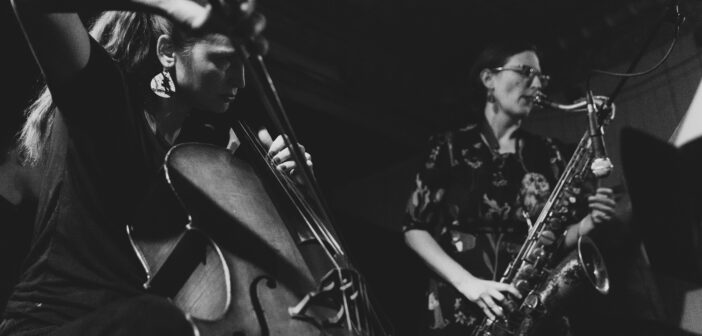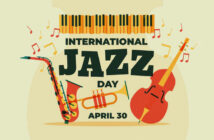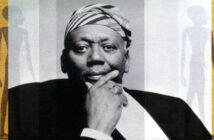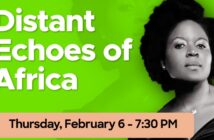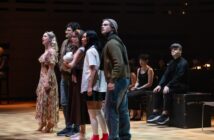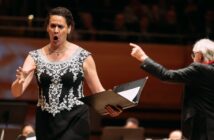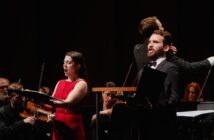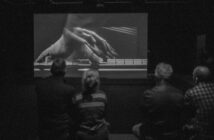It might not be too well-known for those outside of North-America that February coincides with Black History Month, a tradition set in 1976, exactly a half century after its initial instalment on a smaller scale, originally designated as Negro History Week. While the bulk of activities take place in the United States, Canada also has its hand in the pie, so to speak.
FIRST ACT: Charles Tolliver—Africa Brass (and more) / Febr. 28, McGill University
In Montreal for instance, the month came to a close with a performance befitting of the occasion. The fact that it took place on the eve of that added extra leap day of February made it special in a way, underscoring the exceptional nature of the event. Staged in Montreal at one of the two main venues of McGill University’s Faculty of Music, the concert was surely one the most ambitious ones ever held at that institution, its jazz department unquestionably.
As part of its school year, McGill University invites musicians of note to spend short-term residencies, for classical music and jazz. In recent years, the jazz department has done its share in this regard, two recent catches being Louis Hayes and Charles McPherson.
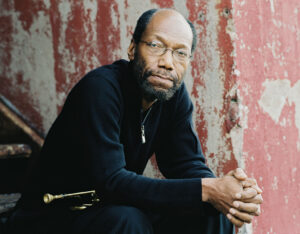
In the ensuing decades, the trumpeter dropped off the radar for a while, issuing a new release on his label sporadically. After a period of obscurity, he found his way back to the Blue Note label in the years ensuing Y2K. But he still managed to keep himself busy, focusing more on composing and arranging for large ensembles, one involving Monk’s music, the other bringing us to his Montreal appearance.
Just ten days before Febr. 28, tickets (free of charge!) were made available for purchase online, and according to insider information they all went within three hours—more par for the course for a Rolling Stones concert than a jazz show.
Divided in two sets, the first half presented Tolliver’s own music arranged by him for combos of 6 to 8 pieces, after which came the pièce de résistance, the playing of the complete 1961 John Coltrane landmark Impulse debut Africa Brass, scored this time for 18 instrumentalists and an added choir of as many voices (not present on the original original recording).
In a public discussion the day previous, Tolliver indicated that the original charts penned by Eric Dolphy had been kept at his parents’ place in LA after his death three years previous but fell prey to the infamous Watts riots of 1967 which had gutted their home. Three decades later, Tolliver patiently reconstructed the music from the recording over a three-month period, all of which was premiered in 1998. Since then, he has brought it to life repeatedly with professional and students ensembles alike, the McGill performance bolstered by faculty members.
While the guest brought his horn, it did not leave the dressing room that night—it surely would have been nice for him to join in for a few choruses in the first half, but so be it. All in all, it was unadulterated hard bop, the harmonies, the melodies, all tried-and-true recipes of another time, all played a little too safely. But the shell was cracked open when faculty member Jean-Michel Pilc let the fingers fly over the piano keys, a move that goaded the others to dig in a little more.
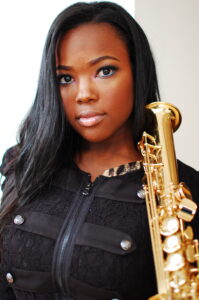
The Africa Brass set reprised all of the music of that historical date, starting with the album’s opening cut Blues Minor. The remaining tunes, the age-old Greensleeves, and the title track were intercut by two more numbers that only saw the light day in subsequent reissues, The Damned Don’t Cry (an original by Calvin Massey featuring Thurman on soprano), and another traditional, Song of the Underground Railroad, with some full-throttle tenor, as it should be.
From start to finish, the second set was a rousing performance, at times raising goosebumps along this listener’s arms The intensity never flagged during this hour-plus set, that did not feel like it, maintained as much by the instrumentalists, who surely put in their innings to nail their parts, as well as by the mixed choir (11 women, 7 men) that heightened the tension in the manner of a horn section riffing behind a free-wheeling soloist, Thurman in this case. While there was a sense of drama, there was nothing sombre, but rather a joyous celebration brought to life, and more forcefully so in a live setting. Kudos also to the drummer Darrell Grant, who stoked the fires without trying to be an Elvin cut-out.
Given his long experience with the music, Tolliver did not stand on a rostrum and play conductor, but wandered all over the stage, and giving cues when needed—could you imagine any maestro doing that during a symphony?
Having seen the trumpeter but a single time in his life, circa 1977(!)—when he interviewed him for one the very first stories of his career—there was more than a passing interest to attend the show. It is said that life often comes around full circle… or is all but serendipity? Who knows. But one thing is for sure: music still has the power to move the soul, as was the case that evening.
Final note: It was long thought that Coltrane never played Africa Brass live, but a recently unearthed tape (John Coltrane – Evenings at the Village Gate—July 1961) allows us to hear him and Dolphy play the title track in a small group setting.
SECOND ACT: Anna Webber – Shimmer Wince / March 15, Casa del Popolo
Photo credits – Evan Shay
If the word ‘stirring’ was a good qualifier for the McGill concert, it too would apply for the second performance recently seen in town. In stark contrast to that large, spacious and resonant venue, the one chosen for this mid-March show was the music room of the Casa del Popolo, an almost living-room size den that becomes SRO beyond its 50 or so seating capacity. (Too bad it was not at the more amenable Sala Rossa across the street.) While there were a few empty chairs, more than a handful of people were standing at the back that evening, albeit not to the point of the place being jammed to the rafters, the numbers good enough to create the needed vibe for the performers.
And the vibe on that night was palpable to say the least, the main attraction receiving enthusiastic applause, if not a tumultuous one at the end of its hour-long set—more than well earned, too, this listener adding his own while standing.

To kick off a whirlwind five-city tour, saxophonist, flutist (and most importantly composer) Anna Webber corralled her new band across the border for its only Canadian stop. In so doing, this B.C. native returned to her Montreal stomping ground of close to two decades ago, earning her Bachelors of Music at McGill there before moving on, first to New York for her Masters, a sojourn to Berlin where she met one her current music partners, and now McGill teacher, John Hollenbeck, all preludes to her setting shop in the Big Apple.
In the years since, she has proven to be one of the most fascinating composers emerging in contemporary jazz, each album taking it a notch up from the previous, as is the case with her Fall 2023 album Shimmer Wince, her debut release on the prestigious Swiss Intakt imprint. For this outing she put together a quintet of like-minded spirits all capable of handling the demands of her music that wears as much of the jazz idiom on its sleeve as some of the more esoteric compositional approaches found in current contemporary music.
One approach that informs Webber’s music is actually quite an old one: just intonation. Earlier that day, she appeared at her former school, giving a lecture-demonstration before an audience of students and faculty, with all of her bandmates on hand. Without loosing track of the purpose of this account (a concert review, not a theoretical exposé), it is still of value to mention that activity, which only enhanced the appreciation of the performance through her explanations of her modus operandi and applications in the pieces, four which she played in the day, six at the show.
During the talk, she gave some of the backstory on her research into the subject, noting that just intonation nowadays is generally used in drone-like music, a route
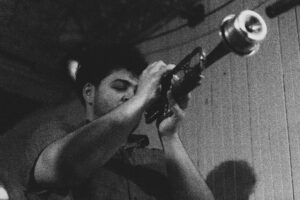
she did not want to follow, and for which we can be thankful. And that is clearly where her jazz pedigree comes into play. Indeed, her music is energetic like what the best of jazz should always be, driven by rhythm and spurred on by frontline players with powerful voices, exemplified a much by her and trumpeter Adam O’Farrill (grandson of the legendary arranger Chico).
Given the underlying concept of just intonation where natural harmonics are produced out of a fundamental pitch instead of the corrected versions of equal temperament, her music may at first be jarring to ears weaned in Western music. As much as music of our culture has a world-wide outreach and is familiar to all, the are many traditions that do not work on those principles, and whose people may have as many difficulties listening to ours as we do theirs.
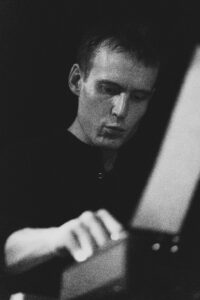
In the context of Webber’s music, her choice of instruments for her band was a not a gratuitous one at all, but tailored to her approach. For one, the use of a synthesizer player (Elias Stemseder) was an appropriate choice, given the instrument’s capability of creating sound patches fitting to the changing requirements of Webber’s timbral parameters, something impossible to do on a piano, the king of all well-tempered instruments.
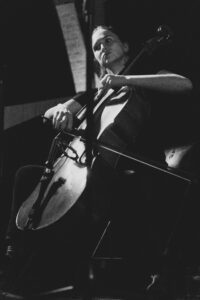
Also of note was the use of cello, a fretless instrument that by nature works on fundamentals and natural overtones, of which Marielle Roberts is well attuned because of extensive experience as an interpreter of contemporary music works, many of which incorportate microtones. But unlike many musicians working in these areas, she is also adept in the practice of improvisation, making her a perfect choice for the group.
On the jazz side of the ledger, and aside from the horns, credit also goes to Leslie Mok’s drumming, effective throughout, driving yet never overbearing, stoking the fires to a steady burn when needed, or

For completeness’ sake, the evening had an opening act, the Yoganathan Cabral Sound Systems, the latter (Jacobs by his surname) on alto sax (egregiously out of tune), the latter (Nimalan by his first) clunking away on drums to an underpinning of numbing electronic drones. Basically, it had its moment, like having to cut their set short as they were about to play their last number after 25 minutes, mercifully saved by a power shortage affecting the whole block for a good 15 minutes, but still a temporary cause of concern for the main act.
As for Webber, she has already made her next move as a leader, again on Intakt, this time returning to her previous small unit Simple Trio, with her stellar partners pianist Matt Mitchell (with whom she is to play a duo at the Open Ears Festival in Knoxville a week thereafter) and drummer John Hollenbeck. And big ears does she have, Anna Webber, as should any listener of creative music.
To hear samples of this band’s work, go to Webber’s bandcamp page. Or better still: purchase it online and give it a good listen or two for best results.

